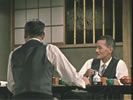Eye For Film >> Movies >> An Autumn Afternoon (1962) Film Review
An Autumn Afternoon was the last film ever directed by Yasujiro Ozu and released in 1962, the year before his death. Rather fittingly the film encompasses the theme and form of his life’s works canvassing the diverse blend of human emotion that characterised his direction. As with Late Autumn, An Autumn Afternoon focuses on the melancholic nostalgia brought on by old age, coupled with the enduring zest for life and humour that was embodied by so many of his characters.
At the centre of Ozu’s last film are recently widowed father Shuhei (Chishu Ryu) and his doting daughter Michiko (Shima Iwashita). Along with her brother Kazuo (Shinichirô Mikami), Michiko cares for her father and, rather than looking for a husband as Shuhei friends suggest, she dotes on her father and cannot contemplate leaving him. When Shuhei gets together with his school friends they are reunited with an old school master Gourd (Eijirô Tono) and he is struck by the parallels between his life and that of his perpetually inebriated tutor. Gourd now works in a noodle shop and is hugely dependent on his unmarried daughter, so much so that the scene fills Shuhei with trepidation over the future of his own daughter and is immediately set on pressing Michiko into marriage.

Putting the plot into such mechanically simplistic terms doesn’t nearly do justice to the story but, as with Late Autumn, the warmth and poignancy comes from the direction and characterisation. The doting love of a daughter for her father is perfectly mirrored by Shuhei's feverish desire to see Michiko marry and save her from a life of solitude. Underlying this is a reluctant sense of Japan slowly but surely embracing Western values and materiality such as Kazuo’s lust for a new set of golf clubs while his wife constantly strives for a modern refrigerator.
An Autumn Afternoon is perhaps alone in its pervading sense of sadness at Shuhei’s generation struggling to find a place in the modern Japan. The fact that, like Gourd, Shuhei is seen to become growingly dependent on alcohol is perhaps also one of Ozu’s troubling omens for the future. Both Shuhei and Michiko seem to personify and overall uneasiness and reluctance that permeated both generation in Japan at the time. The question of whether recent change brought on by world conflict was for the best and how the changing face of the east left many troubled souls in its wake.
Although this may not be Ozu’s most memorable film it is certainly one of his most touching. The prospect of a life of solitude was in fact a reality for Ozu and it is most apt that his final film so effectively and thought-provokingly touches upon the themes of loss and the residing sorrow that emotional isolation can evoke. Although Ozu may have never immersed himself in family life the insight and sensitivity toward the emotional bond between parent and child is a hallmark of his greatest films and An Autumn Afternoon is no exception.
Reviewed on: 28 Feb 2007

















